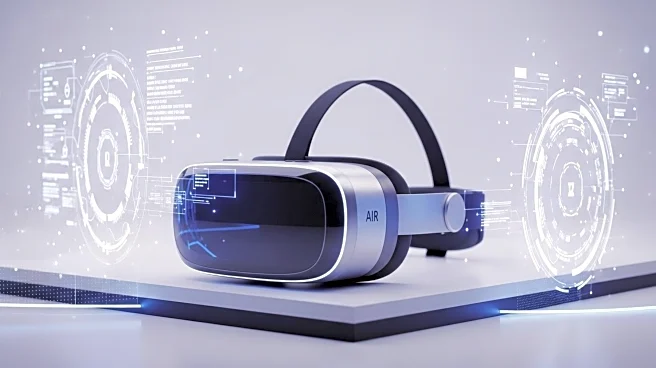What's Happening?
Major technology companies are making significant strides in augmented reality (AR) technology, with several key developments expected to reshape consumer tech by 2025. Apple has introduced a new 'liquid glass' design that promises lighter and more affordable AR glasses, moving away from bulky headsets. Meta has launched Ray-Ban glasses with built-in displays, aiming to test mainstream user experience. Additionally, Chinese manufacturers like Rokid are shipping smaller AR glasses, increasing consumer availability. These advancements are part of a broader trend where companies are focusing on both hardware and software innovations, including partnerships between Google and Magic Leap to enhance AR content. The industry is also seeing supply chain improvements, which are expected to lower prices and increase production by late 2025.
Why It's Important?
The developments in AR technology are poised to have a significant impact on various sectors, including retail, navigation, and social interactions. As AR glasses become more affordable and widely available, they could transition from niche products to everyday tools, influencing how consumers interact with technology. Companies like Apple and Meta are setting the stage for AR to become a mainstream technology, potentially altering consumer expectations and driving innovation in app development. The shift towards more practical applications of AR, such as maintenance and retail try-ons, suggests that these devices could become integral to daily life, offering new opportunities for businesses and developers.
What's Next?
As AR technology continues to evolve, consumers can expect cheaper glass frames to enter the market, along with core apps integrating AR overlays. This could lead to a transformation in user etiquette and social interactions, as AR becomes more prevalent in everyday life. Companies will likely focus on delivering comfortable wear, real applications, and affordable pricing to capture consumer interest. The competition among tech giants to lead in AR innovation will drive further advancements, potentially making AR a staple in consumer technology by 2025.
Beyond the Headlines
The rise of AR technology raises questions about privacy and data security, as these devices could collect and process vast amounts of personal information. Ethical considerations regarding user consent and data protection will become increasingly important as AR devices become more integrated into daily life. Additionally, the cultural impact of AR on social interactions and communication norms will be an area to watch, as these technologies redefine how people connect and share information.











